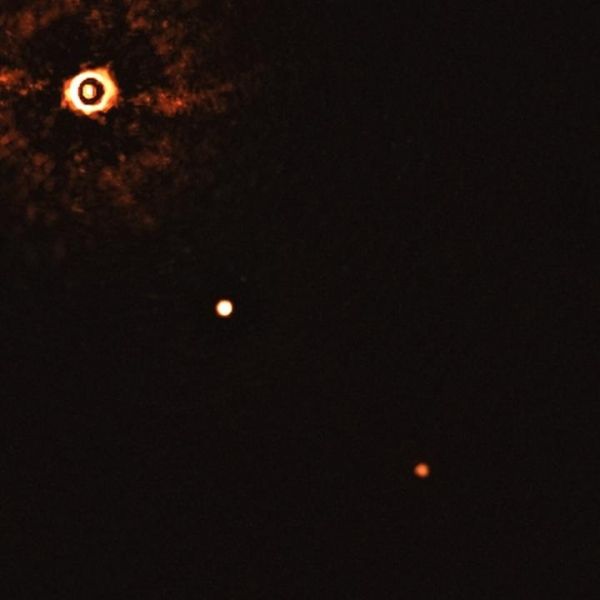The European Southern Observatory’s Very Large Telescope (ESO’s VLT) has taken the first ever image of a young, Sun-like star accompanied by two giant exoplanets. Images of systems with multiple exoplanets are extremely rare, and — until now — astronomers had never directly observed more than one planet orbiting a star similar to the Sun. The observations can help astronomers understand how planets formed and evolved around our own Sun.
Just a few weeks ago, ESO revealed a planetary system being born in a new, stunning VLT image. Now, the same telescope, using the same instrument, has taken the first direct image of a planetary system around a star like our Sun, located about 300 light-years away and known as TYC 8998-760-1.
“This discovery is a snapshot of an environment that is very similar to our Solar System, but at a much earlier stage of its evolution,” says Alexander Bohn, a PhD student at Leiden University in the Netherlands, who led the new research published today in The Astrophysical Journal Letters.
“Even though astronomers have indirectly detected thousands of planets in our galaxy, only a tiny fraction of these exoplanets have been directly imaged,” says co-author Matthew Kenworthy, Associate Professor at Leiden University, adding that “direct observations are important in the search for environments that can support life.” The direct imaging of two or more exoplanets around the same star is even more rare; only two such systems have been directly observed so far, both around stars markedly different from our Sun. The new ESO’s VLT image is the first direct image of more than one exoplanet around a Sun-like star. ESO’s VLT was also the first telescope to directly image an exoplanet, back in 2004, when it captured a speck of light around a brown dwarf, a type of ‘failed’ star.
Read more at ESO
Image: This image, captured by the SPHERE instrument on ESO's Very Large Telescope, shows the star TYC 8998-760-1 accompanied by two giant exoplanets. This is the first time astronomers have directly observed more than one planet orbiting a star similar to the Sun. The image was captured by blocking the light from the young, Sun-like star (on the top left corner) using a coronagraph, which allows for the fainter planets to be detected. The bright and dark rings we see on the star's image are optical artefacts. The two planets are visible as two bright dots in the centre and bottom right of the frame. (Credit: ESO/Bohn et al.)


